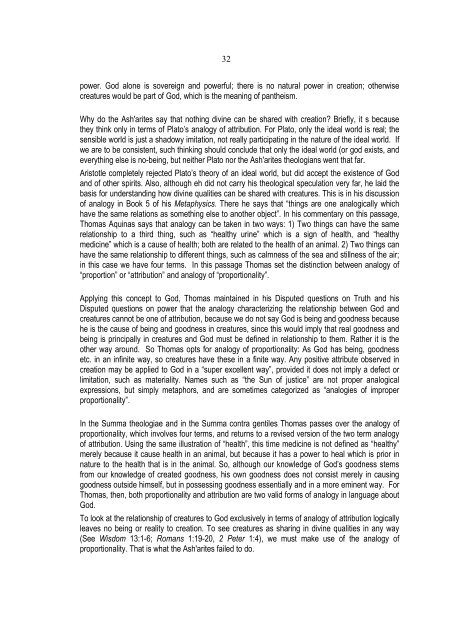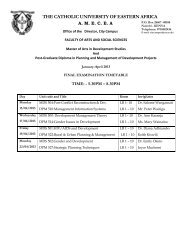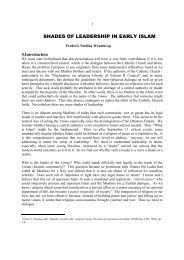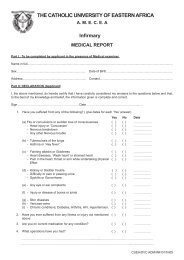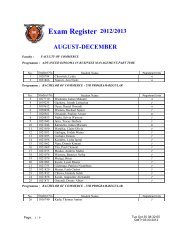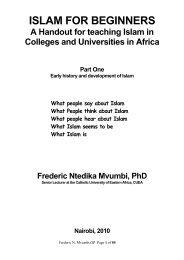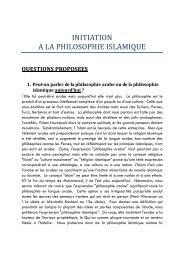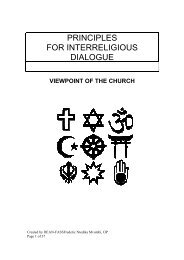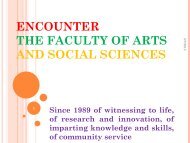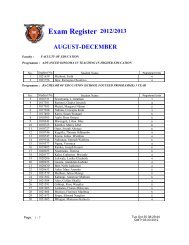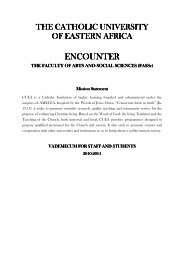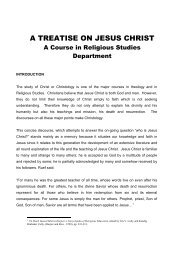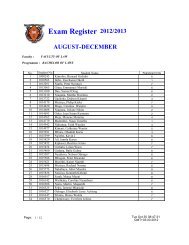INTRODUCTION TO ISLAMIC THEOLOGY.pdf - CUEA
INTRODUCTION TO ISLAMIC THEOLOGY.pdf - CUEA
INTRODUCTION TO ISLAMIC THEOLOGY.pdf - CUEA
Create successful ePaper yourself
Turn your PDF publications into a flip-book with our unique Google optimized e-Paper software.
32power. God alone is sovereign and powerful; there is no natural power in creation; otherwisecreatures would be part of God, which is the meaning of pantheism.Why do the Ash'arites say that nothing divine can be shared with creation? Briefly, it s becausethey think only in terms of Plato’s analogy of attribution. For Plato, only the ideal world is real; thesensible world is just a shadowy imitation, not really participating in the nature of the ideal world. Ifwe are to be consistent, such thinking should conclude that only the ideal world (or god exists, andeverything else is no-being, but neither Plato nor the Ash'arites theologians went that far.Aristotle completely rejected Plato’s theory of an ideal world, but did accept the existence of Godand of other spirits. Also, although eh did not carry his theological speculation very far, he laid thebasis for understanding how divine qualities can be shared with creatures. This is in his discussionof analogy in Book 5 of his Metaphysics. There he says that “things are one analogically whichhave the same relations as something else to another object”. In his commentary on this passage,Thomas Aquinas says that analogy can be taken in two ways: 1) Two things can have the samerelationship to a third thing, such as “healthy urine” which is a sign of health, and “healthymedicine” which is a cause of health; both are related to the health of an animal. 2) Two things canhave the same relationship to different things, such as calmness of the sea and stillness of the air;in this case we have four terms. In this passage Thomas set the distinction between analogy of“proportion” or “attribution” and analogy of “proportionality”.Applying this concept to God, Thomas maintained in his Disputed questions on Truth and hisDisputed questions on power that the analogy characterizing the relationship between God andcreatures cannot be one of attribution, because we do not say God is being and goodness becausehe is the cause of being and goodness in creatures, since this would imply that real goodness andbeing is principally in creatures and God must be defined in relationship to them. Rather it is theother way around. So Thomas opts for analogy of proportionality: As God has being, goodnessetc. in an infinite way, so creatures have these in a finite way. Any positive attribute observed increation may be applied to God in a “super excellent way”, provided it does not imply a defect orlimitation, such as materiality. Names such as “the Sun of justice” are not proper analogicalexpressions, but simply metaphors, and are sometimes categorized as “analogies of improperproportionality”.In the Summa theologiae and in the Summa contra gentiles Thomas passes over the analogy ofproportionality, which involves four terms, and returns to a revised version of the two term analogyof attribution. Using the same illustration of “health”, this time medicine is not defined as “healthy”merely because it cause health in an animal, but because it has a power to heal which is prior innature to the health that is in the animal. So, although our knowledge of God’s goodness stemsfrom our knowledge of created goodness, his own goodness does not consist merely in causinggoodness outside himself, but in possessing goodness essentially and in a more eminent way. ForThomas, then, both proportionality and attribution are two valid forms of analogy in language aboutGod.To look at the relationship of creatures to God exclusively in terms of analogy of attribution logicallyleaves no being or reality to creation. To see creatures as sharing in divine qualities in any way(See Wisdom 13:1-6; Romans 1:19-20, 2 Peter 1:4), we must make use of the analogy ofproportionality. That is what the Ash'arites failed to do.


